Writing a strong college application essay can be the key that opens the door to your dream school. It’s your opportunity to speak directly to admissions officers and show them who you are beyond test scores and transcripts. In this in-depth guide, you’ll learn exactly how to write a college application essay that’s personal, compelling, and memorable—from choosing the right topic to polishing your final draft. Whether you’re a high school student applying to college or an educator helping others, this resource will walk you through every step.
Understanding the Role of the College Application Essay
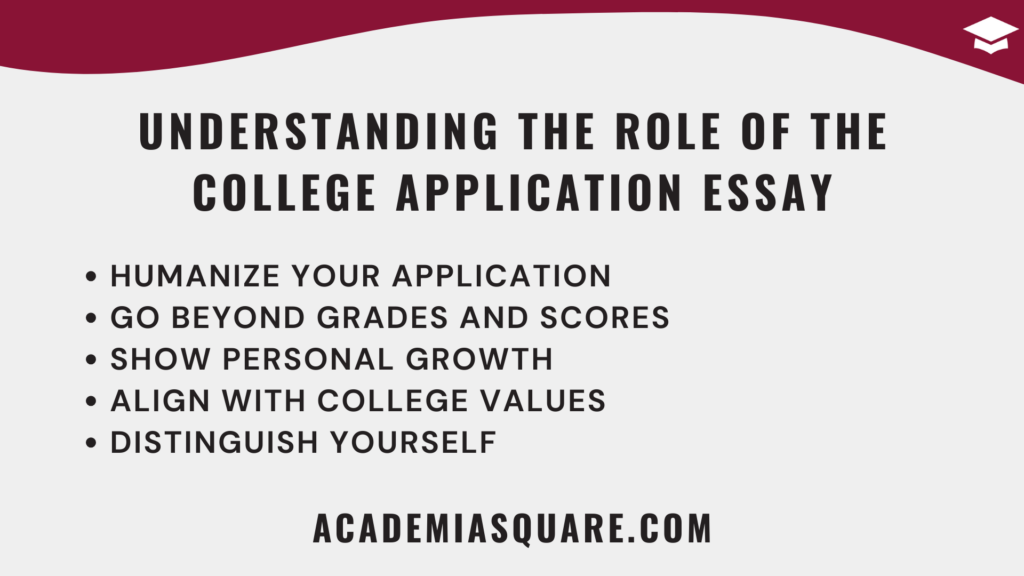
The college application essay is more than just a writing sample—it’s your chance to communicate directly with the admissions committee and present the person behind the grades, test scores, and extracurriculars. Knowing how to write a college application essay that makes an impact can be a turning point in your academic journey. Many students underestimate this component, but colleges often use it to distinguish between candidates with similar academic profiles.
In a landscape where acceptance rates at top institutions can dip below 10%, your essay becomes a form of advocacy for yourself. This chapter will explain why the essay matters, what its true purpose is, and how it fits into the broader application ecosystem. By the end, you’ll better understand why crafting a thoughtful, authentic essay can tip the balance in your favor.
Why the College Application Essay Matters
Admissions officers are looking for more than academic achievements—they want to see your character, resilience, and unique voice. According to a report by the National Association for College Admission Counseling (NACAC), the essay ranks among the top five factors for admission decisions. Especially in test-optional contexts, the essay often carries even more weight.
This is your opportunity to:
- Humanize your application: Reveal who you are beyond your academic record.
- Showcase personal growth: Demonstrate how experiences have shaped your perspective and values.
- Convey fit: Explain why you’re a good match for the institution’s culture and academic offerings.
Understanding How to Write a College Application Essay With Purpose
Many students treat the essay as a writing assignment or a storytelling exercise. But it’s more than that. Knowing how to write a college application essay with purpose means approaching it as a personal mission: show the reader why you belong at their school. This isn’t just about being impressive; it’s about being meaningful, sincere, and strategic.
Admissions professionals read hundreds—sometimes thousands—of essays. They remember the ones that feel honest and reflective. That’s why it’s crucial to avoid cliché responses or overly rehearsed narratives. Instead, focus on moments of transformation or realization in your life. Ask yourself: What experiences made me who I am? How did I grow? What do I care about and why?
What Colleges Look for in a Great Essay
Most universities look for similar qualities in essays, even if prompts vary. The best essays share some consistent features:
- Clarity of thought: The essay should be well-organized and easy to follow.
- Authenticity: Use your own voice. Don’t write what you think they want to hear.
- Depth of insight: Reflect on what experiences taught you—not just what happened.
- Connection to goals: The best essays show a bridge between past experiences and future aspirations.
It’s also important to align your story with the institution’s values. Research the college’s mission statement, campus culture, and academic programs. Then subtly reflect those themes in your essay to show alignment without sounding like you’re pandering.
Checklist: What to Clarify Before You Begin Writing
Before you start drafting your college application essay, clarify these essentials to set a strong foundation:
- What core message or theme do I want to communicate?
- Which personal experiences support this message?
- How does this story highlight qualities that colleges value?
- What tone feels most authentic to me—humble, humorous, reflective, etc.?
Understanding the role of the essay is the first step toward writing one that works. Don’t think of it as a hoop to jump through. Think of it as your chance to take control of the narrative and present a version of yourself that the rest of the application can’t fully convey.
Decoding the Prompt: What Are Admissions Officers Looking For?
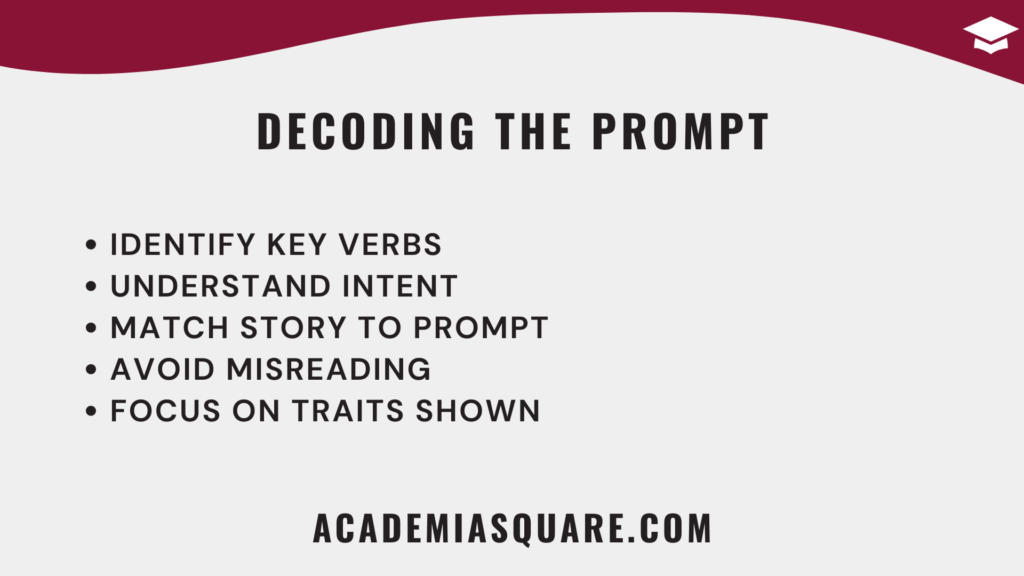
Before you begin writing, it’s essential to fully understand the essay prompt. Every college has its own approach, but most application essays fall into a few broad categories—personal insight, overcoming challenges, demonstrating leadership, or explaining academic interests. Knowing how to write a college application essay that responds directly and thoughtfully to the prompt is a key skill that separates average essays from outstanding ones.
Too often, students misread or under-analyze the prompt. The result is an essay that feels generic or misses the mark entirely. Understanding the underlying intent of the question helps you choose the right story and structure your response effectively. Colleges aren’t just looking for answers—they’re evaluating how you interpret and reflect.
Common College Essay Prompt Types
Though wording varies by institution, most prompts can be grouped into these types:
- The Personal Growth Prompt: Describe a challenge, setback, or failure. What did you learn?
- The Identity Prompt: Discuss a background, interest, or talent that defines you.
- The “Why Us” Prompt: Explain why you want to attend this specific college.
- The Future Focus Prompt: Talk about your career goals or academic ambitions.
Each type seeks specific qualities—self-awareness, curiosity, motivation, or resilience. Identify what the college wants to assess, then reflect that in your response.
How Admissions Officers Interpret Your Answer
Officers are reading hundreds of essays, often in a short time frame. They’re not grading you like a teacher would—they’re looking for insight into your personality, values, and fit for the institution. What matters most is whether your essay helps answer this question: Would this student thrive here?
When reading your response, they ask themselves:
- Does this student reflect emotional intelligence and maturity?
- Can they articulate their experiences meaningfully?
- Do they align with the college’s culture or mission?
Tips to Decode Any Essay Prompt Effectively
Follow this checklist when breaking down a prompt:
- Highlight all action verbs (e.g., “describe,” “analyze,” “explain”).
- Underline the topic or concept you’re being asked to explore.
- Ask yourself: What personal qualities does this prompt invite me to showcase?
Once you’ve decoded the prompt, your job is to answer it clearly, honestly, and insightfully. Avoid tangents. Stay anchored to the question’s core demand, and use your experiences to construct a direct, yet thoughtful, response.
Planning Your Essay
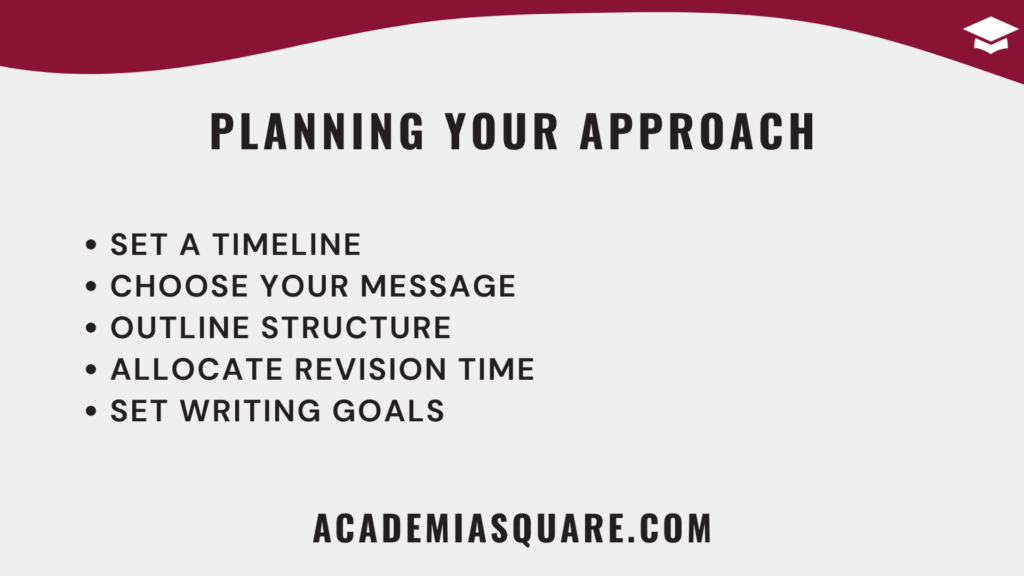
Planning is the hidden engine behind a strong essay. Diving straight into writing may seem efficient, but it often results in scattered ideas and superficial storytelling. Knowing how to write a college application essay with clarity begins long before your fingers hit the keyboard. In this chapter, we’ll lay out a step-by-step plan that sets you up for success by aligning purpose, timeline, and technique.
Admissions officers are seasoned readers—they can tell when an essay was rushed or overly polished. A structured planning process helps strike the right balance between authenticity and strategy, allowing your true voice to shine through.
Create a Realistic Essay Timeline
One of the biggest mistakes students make is starting too late. The best essays are revised multiple times and benefit from pauses between drafts. Give yourself at least 4–6 weeks. A typical timeline might look like:
- Week 1: Brainstorming and selecting your topic
- Week 2: Drafting your first version
- Week 3–4: Revising for structure and content
- Week 5: Getting feedback and refining
- Week 6: Final proofreading and polishing
Choosing the Right Story to Tell
Your essay isn’t just a story—it’s a strategic representation of who you are. Select a narrative that highlights your core values and aligns with what colleges look for (e.g., curiosity, empathy, resilience). Ask yourself:
- What experience challenged me or changed my worldview?
- What do I want the reader to understand about me?
- How does this story support my broader application?
Remember, ordinary moments can become extraordinary essays if they reveal something real and reflective.
Mapping Out the Essay Structure
Before you write, outline your essay’s structure. While the standard intro-body-conclusion format works, college essays benefit from creative formats as well. You might try a circular structure, a moment-in-time focus, or a reflective dual-narrative approach. Regardless of form, ensure:
- Your introduction grabs attention (start with action, emotion, or insight)
- Your body explores your growth or change
- Your conclusion reflects and ties back to your broader aspirations
Planning gives you clarity, reduces stress, and increases the odds that your essay will truly speak to your audience. Skipping this step is like building a house without a blueprint—possible, but unwise.
Finding Your Unique Story: Brainstorming Techniques
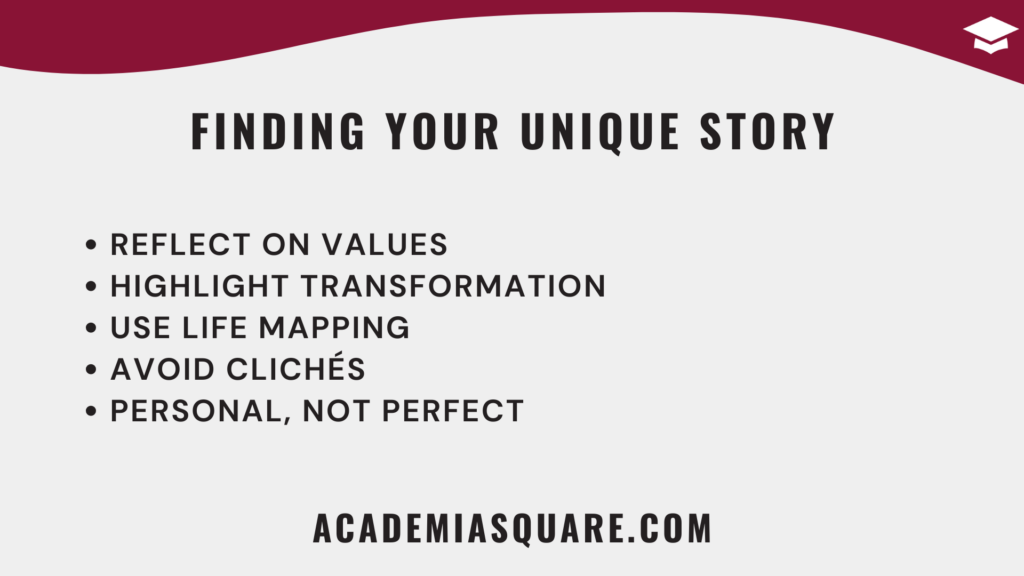
Brainstorming is the creative foundation of essay writing. If you’re wondering how to write a college application essay that stands out, the key is finding a story only you can tell. Many students believe their lives aren’t interesting enough—but uniqueness isn’t about drama or prestige; it’s about voice, insight, and perspective.
This chapter introduces tested brainstorming strategies to uncover meaningful topics rooted in your personal truth. Good essays don’t come from trying to impress—they come from deep, honest exploration of who you are.
What Makes a Story “Unique Enough”?
Admissions officers have read countless essays about sports wins, family challenges, and volunteer trips. What makes one essay better than another is the depth of reflection, not the novelty of the event. A unique story often:
- Shows growth or emotional evolution
- Explains a personal value or belief
- Captures a moment that shaped your identity
Brainstorming Techniques to Try
- Values Exercise: List your top five values. Then recall memories that reflect each one.
- Time Travel: Think of a moment you’d relive or a time you wish you could redo. Why?
- The 21 Questions: Answer 21 rapid-fire questions like “What’s your favorite failure?” or “What’s the best advice you’ve ignored?”
- Life Map: Sketch a timeline of important events and annotate with feelings or takeaways.
Choosing the Right Narrative Angle
Once you’ve surfaced a few potential stories, evaluate them based on clarity, relevance, and emotional weight. Ask yourself:
- Does this story reflect something meaningful about who I am?
- Can I describe it vividly in under 650 words?
- Does it reveal a trait or perspective that isn’t obvious elsewhere in my application?
It’s okay to explore multiple ideas before settling on one. Many of the best essays began as false starts or “bad ideas” that evolved into something powerful through revision and reflection. Brainstorm without judgment—clarity often comes through the process itself.
Structuring Your Essay: Crafting a Cohesive Narrative
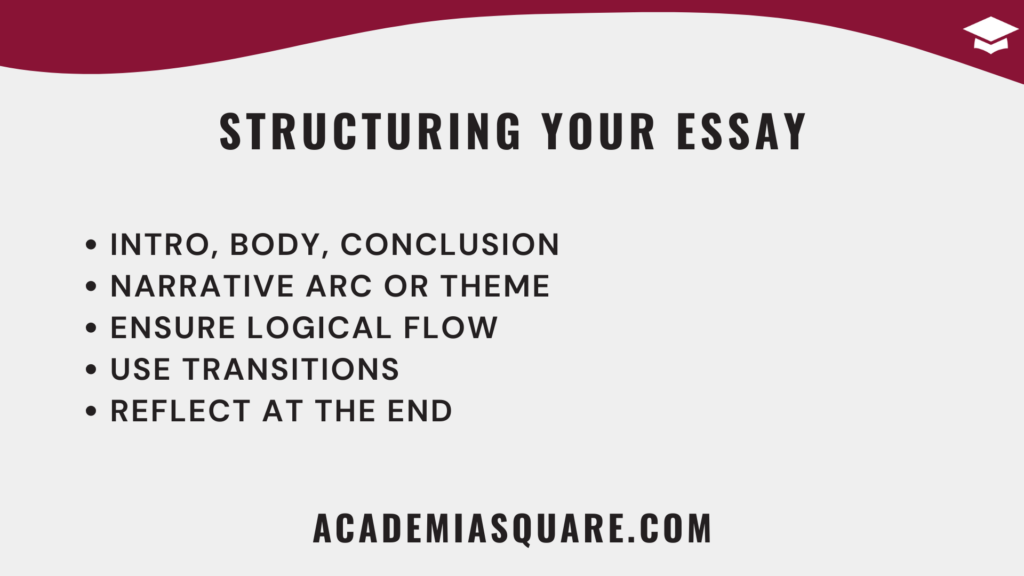
Once you’ve chosen a story, the next step in how to write a college application essay is giving that story a structure that guides your reader through your experience. Even a powerful idea can fall flat if it lacks flow and coherence. A strong structure provides rhythm and clarity, helping admissions officers follow not just what happened, but what it meant to you.
Think of your essay as a short story with a beginning, middle, and end. But unlike a fictional story, this one must be true, meaningful, and strategic. Whether you’re writing about a personal challenge, an academic passion, or a quiet realization, the structure is what gives your narrative shape and impact.
The Classic Narrative Arc (That Still Works)
Most successful essays follow a basic narrative arc that mirrors storytelling in literature. It’s simple, but powerful:
- Exposition: Introduce the setting and context.
- Conflict: Present a problem or challenge you faced.
- Climax: Describe the moment of change or decision.
- Resolution: Show how you grew or what you learned.
This framework isn’t rigid—you can adapt it. But it ensures your essay has forward motion, emotional depth, and a clear takeaway.
Alternative Structures for Creative Impact
If the standard arc feels limiting, consider one of these creative yet effective structures:
- The Thematic Thread: Tie multiple small stories together around one central theme (like resilience or curiosity).
- The Snapshot Essay: Zoom into one short moment in time and build meaning around it.
- The Circular Structure: Begin and end your essay with the same moment or image to show transformation.
Whatever approach you choose, clarity is key. Your reader should always know where they are in the story and why it matters.
Paragraph Planning and Flow
Within the overall structure, your paragraphs should also serve a clear purpose. Typically:
- Introduction: Hook the reader and introduce the main idea.
- Body: Build the narrative, show progression, and deepen reflection.
- Conclusion: Reflect on how the experience shaped you and connects to your goals.
Transitions between paragraphs matter more than you think. A poorly placed paragraph can make even a great idea feel disjointed. Use signposts, motifs, or even sentence-level echoes to create continuity and build emotional momentum.
Writing with Authenticity: Showcasing Your Voice
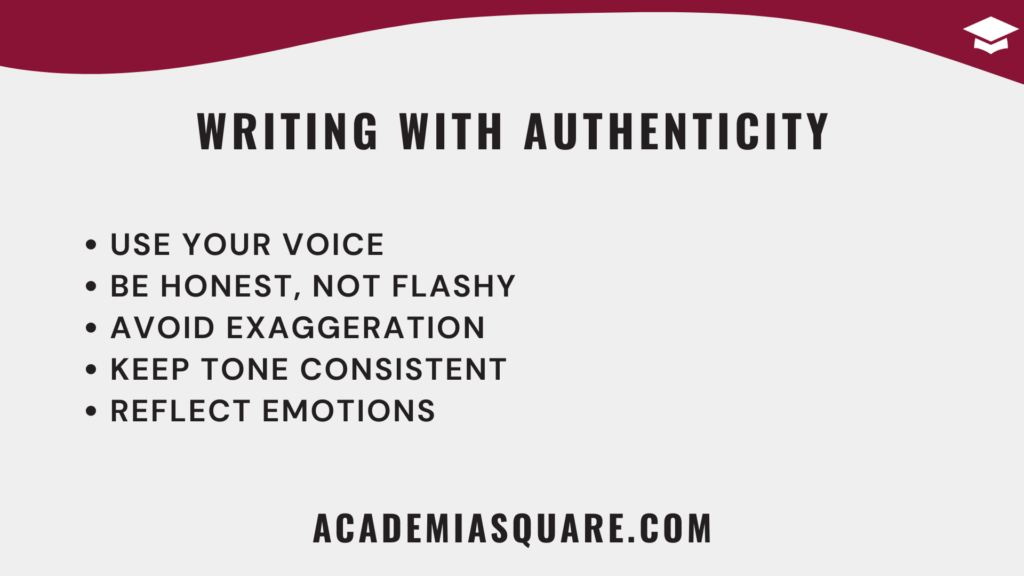
Many students ask not only how to write a college application essay but how to sound “right.” They fear sounding too casual—or too formal. But there’s no “right voice,” only your voice. Authenticity is one of the most valued traits in an essay, and it’s what makes your writing stand out in a sea of polished, predictable prose.
Admissions officers are trained to detect canned responses, exaggerated stories, or overly scripted language. They’re looking for personality, not perfection. Your essay should feel like a conversation with someone who genuinely wants to know you—not a performance or a résumé in disguise.
What Authentic Voice Looks (and Sounds) Like
Your authentic voice is your natural way of communicating, shaped by your background, culture, and personality. It doesn’t mean slang or informality—it means sincerity. You can be funny, serious, introspective, poetic, or analytical, as long as you’re being true to yourself.
- Avoid generic language: Phrases like “I learned the true meaning of leadership” are overused and empty.
- Write like you speak—refined: You can be conversational, but edit for clarity and rhythm.
- Let emotions show: Vulnerability and honesty leave a lasting impression.
Finding and Honing Your Essay Voice
If you’re struggling to sound authentic, try these exercises:
- Record yourself talking about your topic out loud. Transcribe it. Highlight any vivid phrases or honest moments.
- Write your essay as a letter to a friend. Then revise it into essay form.
- Ask someone who knows you well to read a draft and describe what “feels” like you—and what doesn’t.
It may take a few drafts to find your voice, and that’s okay. The process of writing a college application essay is as much about discovery as it is about presentation.
What to Avoid: Signs You’re Losing Your Voice
It’s easy to fall into traps that dilute your personality. Watch out for:
- Overly academic or robotic phrasing
- Buzzwords or terms you wouldn’t use in everyday speech
- Stories that feel borrowed or calculated to impress
Remember: your voice is your advantage. No one else has your story told your way. In a competitive admissions landscape, being real—not rehearsed—is what leaves a lasting impression.
Writing a College Application Essay That Reflects Growth
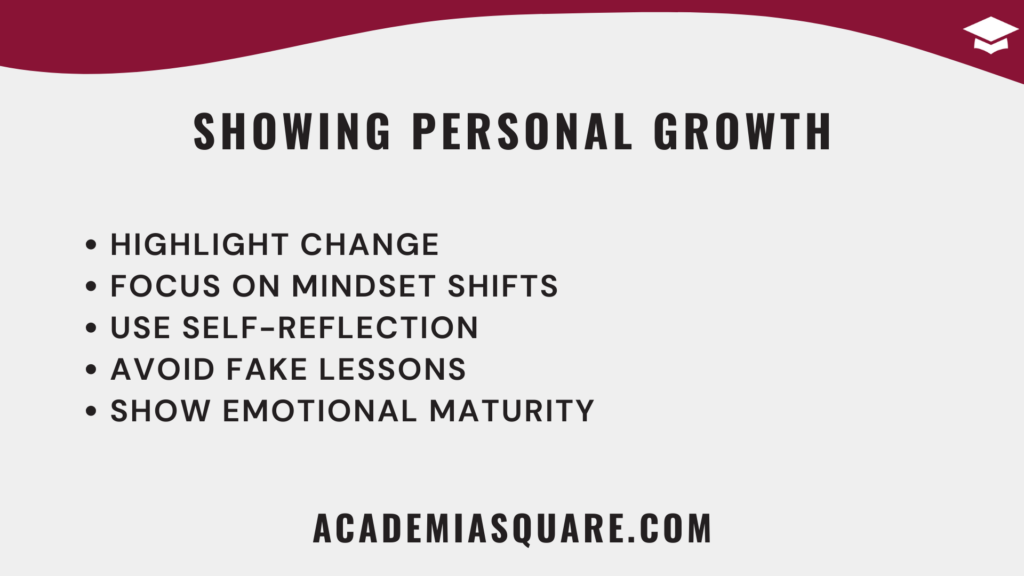
One of the most important things colleges want to see in your essay is personal growth. Whether you’re writing about a small misunderstanding or a major life change, what matters most is how you changed, not just what happened. This chapter explores how to build a narrative that clearly illustrates development—emotional, intellectual, or ethical.
Knowing how to write a college application essay that reflects growth means moving beyond storytelling to show evolution. It’s about demonstrating maturity, resilience, and the ability to reflect on your experiences in a meaningful way.
Why Growth Matters to Colleges
Admissions officers are projecting forward. They want to admit students who will take advantage of the opportunities college offers, engage with challenges, and continue developing. An essay that shows self-awareness and a learning mindset is a strong indicator of potential success.
Colleges look for:
- Adaptability: Can you learn from setbacks?
- Self-reflection: Do you understand your own behaviors and decisions?
- Emotional intelligence: Can you empathize with others or manage complex emotions?
How to Highlight Personal Growth
Start with an experience that challenged you. Then go deeper. Ask yourself:
- What did I believe before this event?
- What was the turning point or realization?
- How did this change how I think, feel, or act?
Your essay should show a contrast—between who you were and who you became. The more specific and honest you are, the more convincing your growth arc will be.
Avoid the “Fake Growth” Trap
Some students feel pressure to manufacture a dramatic transformation. But growth doesn’t have to be dramatic. A shift in mindset, an improvement in empathy, or a refined passion is enough—as long as it’s sincere.
- Don’t force a moral lesson that doesn’t feel true.
- Avoid overstating change—growth can be gradual.
- Focus on your internal evolution, not just external results.
By the end of your essay, readers should feel they’ve witnessed a journey. It should be clear that the experience you shared didn’t just happen to you—it helped shape who you are. That’s the essence of growth, and it’s one of the most powerful themes in how to write a college application essay that resonates.
Avoiding Common Pitfalls: What Not to Include
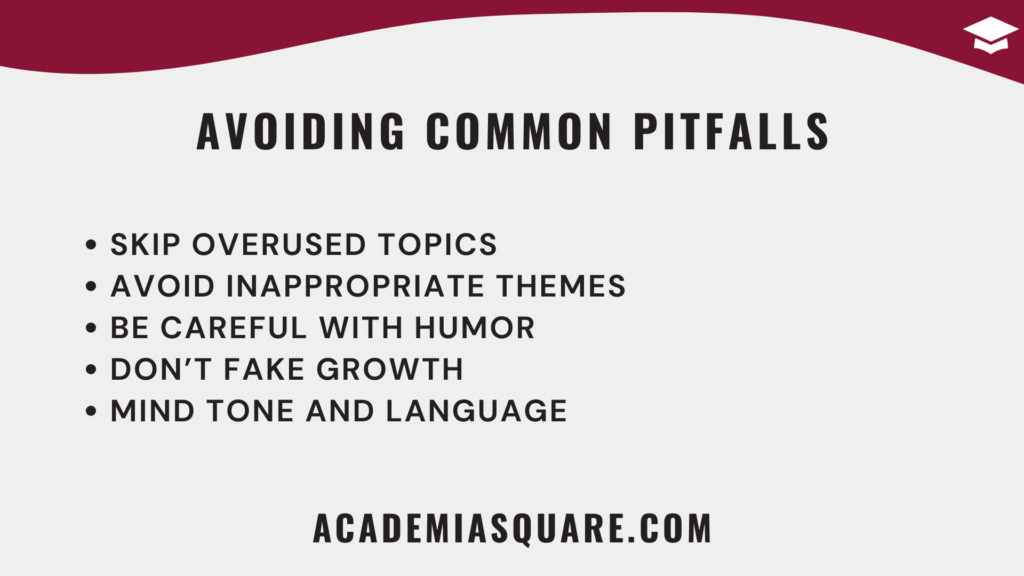
Even if you know how to write a college application essay structurally and authentically, missteps can still weaken your impact. Certain topics, tones, and clichés can undermine your essay’s strength or even create red flags for admissions readers. This chapter covers the most common traps students fall into—and how to avoid them without losing depth or honesty.
It’s important to remember: not every personal story is right for a college essay. Some topics may come off as insincere, trivial, or inappropriate, even if they feel meaningful to you. Awareness of these pitfalls helps you build a narrative that is honest and effective—without being risky or ineffective.
Overused Topics to Avoid
Some themes are not problematic in themselves but are so common that they require exceptional insight to stand out. If you choose these, approach them with fresh perspective and deep self-reflection:
- Sports victories or defeats: Focus on inner transformation, not just the win/loss.
- Mission trips or charity work: Avoid a “savior” narrative. Emphasize what you learned, not what you gave.
- Tragedy without reflection: Don’t write just to shock. Show how you’ve processed the experience and grown.
Topics That May Raise Red Flags
Some topics are better left unexplored in college essays—not because they’re taboo, but because they’re difficult to write about responsibly. These include:
- Illegal activities: Even if you learned from the experience, it may raise character concerns.
- Extreme political or religious views: You risk alienating readers or appearing inflexible.
- Unresolved mental health issues: Focus on recovery and strength rather than trauma itself.
It’s not about censorship—it’s about strategic storytelling. College admissions is a professional context, and your essay should reflect emotional maturity and awareness of your audience.
Tone and Language Mistakes
Even great content can be derailed by tone. Avoid:
- Arrogance: Confidence is good; overconfidence reads as bragging.
- Excessive humor or sarcasm: Tone can be hard to interpret, especially across cultures.
- Overuse of thesaurus words: Write clearly and naturally. Big words don’t always impress.
Admissions readers aren’t looking for perfection—they’re looking for depth, self-awareness, and sincerity. Staying mindful of these pitfalls keeps your writing honest and effective without crossing lines or falling into clichés.
Revising and Editing: Polishing Your Essay
Writing the first draft of your essay is a major step—but it’s only the beginning. If you’re serious about how to write a college application essay that wins attention, revision is where the real magic happens. Most successful essays go through at least three to five rounds of revision, each one sharpening clarity, structure, and emotional impact.
Revising isn’t just correcting grammar—it’s about rethinking what you’re saying, how you’re saying it, and how effectively you’re connecting with your audience.
The Revision Process: A Layered Approach
Break your revision process into focused stages. This helps you catch different types of issues more effectively:
- Stage 1: Big Picture – Are the structure, theme, and message clear and coherent?
- Stage 2: Paragraph Clarity – Does each paragraph serve a purpose and flow logically?
- Stage 3: Sentence Polish – Are sentences varied, clear, and concise?
- Stage 4: Proofreading – Eliminate grammar, punctuation, and spelling errors.
Questions to Ask Yourself During Revision
Use these guiding questions to improve your draft:
- Does this essay clearly answer the prompt?
- Can someone unfamiliar with me understand and follow the story?
- Do I sound like myself—or like someone I’m trying to imitate?
- Have I shown how I’ve grown or changed?
It helps to set your essay aside for a few days before revising. A fresh perspective can reveal weaknesses or inconsistencies you missed before.
Editing Tools and Techniques
Beyond your own eyes, take advantage of tools and trusted readers:
- Use grammar checkers like Grammarly or Hemingway Editor for mechanical polish.
- Read your essay out loud—it’s the best way to catch awkward phrasing or monotony.
- Print out a hard copy and edit with a pen. The tactile change can reveal issues.
Remember, editing is not about making your essay perfect. It’s about making it clear, compelling, and true to you. Be ruthless, but don’t lose your voice in the process.
Incorporating Feedback: Balancing Input with Personal Voice
Feedback is essential, but not all feedback is equal. When you’re figuring out how to write a college application essay, knowing how to receive, interpret, and apply feedback is a skill in itself. You want input that helps clarify your message—not transform it into someone else’s voice.
It’s easy to get lost in well-meaning suggestions. Too many edits, especially from multiple people, can dilute your voice and flatten your story. This chapter explores how to use feedback wisely while keeping your essay authentic.
Whom to Ask for Feedback
Choose 2–3 readers max. Any more, and you risk confusion. Look for people who know you well and understand the college admissions context:
- Teachers or counselors – for structure, clarity, and tone
- A trusted adult – for voice, emotional impact, and personal relevance
- Peers – for readability and relatability
Avoid asking someone to rewrite sections for you. Instead, encourage them to ask questions or highlight parts that feel strong or confusing.
Types of Feedback to Prioritize
Focus on feedback that targets:
- Clarity of message and structure
- Emotional authenticity and engagement
- Redundancy or confusing phrasing
Ignore feedback that suggests changing your core story unless it truly feels off. The best edits enhance your ideas, not replace them.
Maintaining Control of Your Essay
Always return to this question: Does this still sound like me? If the answer is no, take a step back. Trust your instincts. You’re the one who will be represented by this essay—your voice, your story, your application.
As you implement edits, consider keeping multiple versions of your draft so you can compare and revert if needed. Feedback is valuable—but your voice is what ultimately makes your essay memorable.
Finalizing Your Essay: Preparing for Submission
Once you’ve revised, edited, and incorporated feedback, you’re almost at the finish line. But before you hit “submit,” there’s one last essential step in how to write a college application essay: finalizing it for submission. This isn’t just about proofreading—it’s about ensuring your essay meets all requirements, represents you accurately, and flows cleanly into the rest of your application.
At this stage, small details can make a big difference. Typos, formatting issues, or last-minute changes can weaken an otherwise strong essay. Think of this as quality control: a checklist to guarantee your essay is polished, professional, and presentation-ready.
The Final Proofreading Checklist
Even after multiple drafts, your essay still needs one last close read. Use this checklist:
- Read it aloud slowly. Listen for rhythm, tone, and clarity.
- Check grammar, punctuation, and spelling—word by word.
- Make sure sentence variety and transitions are smooth.
- Eliminate any repetition or awkward phrasing.
Reading aloud is especially powerful. It helps you catch issues your eyes skip over silently and ensures your voice comes through naturally. Also, print a copy and read it on paper—errors often stand out more that way.
Technical Submission Considerations
Each college platform (Common App, Coalition, school portals) may have its own submission rules. Always double-check:
- Word count: Stay within the required range—usually 250–650 words.
- Formatting: Remove special characters, emojis, or unusual fonts.
- File type and format: Some platforms require pasting text, others ask for uploads.
Don’t leave formatting to chance. Paste your essay into the submission box early and preview it. Ensure paragraph breaks remain intact and that nothing looks misaligned.
Do a Final Content Gut-Check
Before clicking submit, ask yourself:
- Does this essay feel like an honest reflection of who I am?
- Have I shared something that isn’t obvious from the rest of my application?
- Will the reader walk away with a strong sense of my character, voice, and growth?
This is your last chance to ensure that your essay complements—not repeats—your résumé, transcript, or recommendation letters. It should add a new dimension to your profile.
Submitting your college application essay can feel like releasing a part of yourself into the unknown. But if you’ve followed each step with intention and authenticity, your essay will do its job—helping admissions officers see the real you.
Real Examples and Analysis
Seeing examples of real college application essays can make abstract advice tangible. In this chapter, we’ll examine excerpts from actual college application essays that worked—and break down why they were effective. If you’re wondering how to write a college application essay that rises above the rest, studying real examples is one of the best ways to sharpen your instincts.
These essays aren’t perfect because they used big words or fancy structure. They’re successful because they are personal, reflective, and sincere. Use these examples not to copy—but to understand what authenticity, growth, and voice look like on the page.
Example 1: A Moment of Resilience
“When I stood at the front of the room, heart pounding and palms sweating, I realized this was more than a presentation—it was the first time I was truly seen.”
This introduction is immediate and vulnerable. It places the reader in a moment of high emotion and signals internal transformation. What makes it work?
- Engaging hook: The writer doesn’t start with context—they start with action.
- Emotional honesty: The feelings are specific and relatable.
- Implied growth: The reader anticipates a story of change.
Example 2: A Story with Personality and Humor
“I speak three languages: English, Spanish, and Guitar Hero.”
This opening line uses humor and creativity while still introducing a key theme—adaptability and learning through unconventional means. It works because:
- It reveals personality immediately
- It’s unique, but not gimmicky
- It connects to a broader theme (in this case, how the student learned through play)
What to Learn From These Essays
Great essays:
- Begin with a clear, engaging moment—not generalities
- Build meaning from the writer’s internal perspective
- Reveal personality through details and voice
- Show growth without preaching or boasting
As you finalize your own essay, revisit these examples to inspire structure, pacing, and honesty. Think less about impressing the reader, and more about inviting them into your story. That’s the core of knowing how to write a college application essay that resonates—being unforgettably yourself.
FAQs – How to Write a College Application Essay
Can I hire someone to write my college application essay for me?
No, you should never hire someone to write your college application essay. Admissions officers can usually detect inconsistencies in voice or content. According to NACAC, authenticity is one of the most valued traits in application essays, and dishonesty can result in application rejection or rescinded admission.
Is it okay to use AI tools to write my college essay?
AI tools can help with brainstorming and organizing ideas, but you should never rely on them to write your entire essay. Essays should reflect your unique voice and experiences. According to a 2023 study from Inside Higher Ed, essays written by AI lack the emotional nuance that admissions officers value most.
How long should a college application essay be?
Most college application essays should be between 250 and 650 words. The Common App recommends staying close to the upper limit to provide enough detail and depth without overwhelming the reader.
What do admissions officers look for in a college essay?
They look for authenticity, personal growth, clarity of thought, and how well the essay answers the prompt. According to the National Association for College Admission Counseling (NACAC), essays help admissions officers understand a student’s background, voice, and potential fit for the campus community.
What topics should I avoid in a college application essay?
Avoid overly controversial topics, tragic stories without reflection, and clichés such as sports victories or generic volunteering experiences. The College Board advises students to focus on topics that reveal personal insight, not just impressive events.
Can I use humor in my college essay?
Yes, humor can be effective if it feels natural and appropriate. Just be sure it doesn’t undermine the seriousness of your message or confuse the reader. A 2019 study published in the Journal of College Admission notes that well-placed humor can make an essay more engaging when balanced with sincerity.
How do I choose the best topic for my essay?
Choose a topic that highlights your personal growth, values, or a moment of insight. Research by the Education Advisory Board shows essays focused on self-reflection and identity tend to resonate more with readers than those focusing solely on achievements.
Should I follow a standard structure in my essay?
Yes, a clear structure helps the reader follow your story. Most strong essays have an engaging introduction, a body with narrative and reflection, and a conclusion that ties everything together. However, creative formats can also work if they enhance the message and maintain coherence.
Can I reuse my essay for different college applications?
You can reuse essays if they match the prompts, but always tailor them to the specific college’s values and expectations. Admissions committees can tell when an essay is too generic or copied across applications.
What role does voice play in my essay?
Your voice is crucial—it’s what makes your essay personal and memorable. Research from NACAC confirms that admissions officers prioritize essays that convey a clear sense of the applicant’s personality, rather than those that feel overly polished or ghostwritten.
How many drafts should I write?
Most strong college essays go through 3–5 drafts. Each revision helps refine your structure, improve clarity, and ensure your voice remains authentic. Peer feedback and time between drafts also enhance your ability to self-edit effectively.
Can I include quotes or famous sayings in my essay?
It’s best to avoid starting with quotes, as admissions officers prefer hearing your own voice from the outset. If you use a quote, make sure it directly supports your theme and is clearly tied to your personal insight.
Do grammar and spelling really matter in college essays?
Yes, they do. While one typo won’t ruin your chances, multiple errors can make you seem careless or unprepared. According to the College Board, proper grammar helps demonstrate your communication skills and attention to detail.
Sources and Recommended Reading on How to Write a College Application Essay
- Henderson, Susan E. “A College Entrance Essay Exam Intervention for Students With High-Incidence Disabilities.” Journal of Advanced Academics, 2020.
- Mayes, Alice. “Trauma Drama: The Trouble with Competitive Victimhood in College Application Essays.” Journal of Youth Studies, 2022.
- Johnson, Marc. “The Rhetoric of College Application Essays: Implicit Expectations and Instructional Implications.” ERIC, 2013.
- Miller, Dana. “Too Many Essays! Strategies for Managing Multiple College Application Essays.” ERIC, 2020.
- OpenStax: “Your Academic Journey and Personal Story”
- OpenStax: “Applying for College and Making Your Decision”
- Putnam, Adam L., et al. “Ten Benefits of Testing and Their Applications to Educational Practice.” Psychology of Learning and Motivation, 2016.
- Rawson, Katherine A., and Dunlosky, John. “When Is Practice Testing Most Effective?” Educational Psychology Review, 2018.
- Academia Square: How to Apply to American University as an International Student
- Academia Square: How to Choose a University
- Academia Square: How to Choose a College Major


